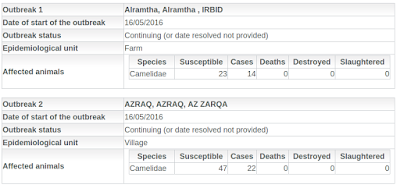#11,601
Although we've known for several years that camels can contract and shed the MERS virus (see 2014's EID Journal: Replication & Shedding Of MERS-CoV In Inoculated Camels) routine surveillance and reporting of outbreaks to the OIE hasn't been very common in the Middle East.
Last January Saudi Arabia submitted their first OIE notification (and has filed 2 follow-up reports) on 8 outbreaks in camels.
Overnight the OIE published the first such report from Jordan, which covers two MERS outbreaks in camels, which occurred in May of this year.
Although most MERS cases are the result of human-to-human transmission, the virus has yet to obtain a firm foothold in the human population and outbreaks appear to die out fairly quickly.
It has been largely through the continual reintroduction of the virus to humans from camels that has kept the virus in circulation.
While precautions (gloves, masks, etc.) are urged for those having close contact with camels, and the public have been urged to avoid raw camel milk and other camel products, there has been strong public resistance (see Saudi Camel Owners Threaten Over MERS `Slander’) to these recommendations.
Hopefully routine testing, the quarantining of infected herds, and public disclosures such as this one will help convince camel owners to take the proper steps to protect themselves and their customers from infection.


